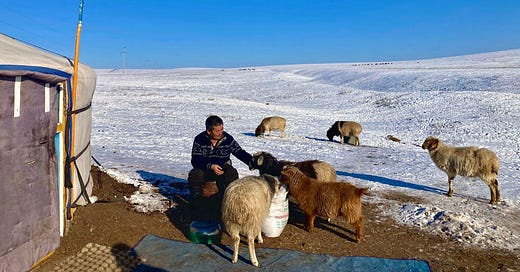I met Noa in Darkhan last fall, where she teaches English. Unlike most foreigners in Mongolia, she had not only chosen to leave Ulaanbaatar, but before leaving she had often trekked up into the Ger district, the most populated part of Mongolia, and one that most outsiders, and plenty of well-to-do locals, feel is unsafe, or uninteresting. Her daunting curiosity impressed me.
A fair remark I hear from readers is that I’m a large guy, and so my “style” of travel isn’t necessarily available to all, especially females. It’s a good point, so I want to mix in some guest posts by people like Noa (a petite young female), who while different from me, shares my intellectual inquisitiveness.
This is her first piece, on a summer of travel throughout Mongolia, which I hope you like as much as I do. — Chris
I have lived in Mongolia for the past two years and visited fourteen of its twenty one provinces, forming connections with communities big and small throughout the country.
I spent the first three months in Ulaanbaatar. I arrived in fall when the air was still fresh and crisp but soon encountered the city’s near un-breathable winter pollution. I could see the air in front of me and feel it in the back of my throat. When I got home at the end of the day, a greasy coat of soot covered any exposed skin, so given the opportunity, I eagerly traded the disorder of the city for Darkhan, a small city with a population of around 100,000 people. I was searching for clear skies and fewer homeless guys begging for fractions of pennies in the bitter cold1.
Before coming to Mongolia I spent time in North and South America, Europe, the Middle East, and Africa. I spent anywhere between two weeks and four months in each place. By the time I left, I could usually articulate the essence of the culture and people, even if only on a basic level. In Mongolia, however, it took an entire year to feel that I could gain a coherent understanding.
It wasn't the language barrier that hindered my Mongolian friends from explaining their culture and customs, but rather the difficulty translating these concepts into Western terms. I've studied several languages, both formally and informally—Spanish, German, French, Hebrew, to name a few. Yet, learning Mongolian felt distinctly different, unfamiliar in a way I hadn’t experienced before.
At first I would joke that speaking Mongolian is like “Yoda talk”. The verb comes at the end of the sentence so that to an English-speaking brain the sentences sound scrambled and nonsensical. That still rings true but not only because of the sentence structure.
The way Mongolians communicate and express ideas is fundamentally different from English and other languages I’ve studied — it simply doesn’t translate. To American ears, the language may sound harsh; Mongolians often make direct, blunt demands that, in English, would be considered very rude2. It is a language rich with metaphor and lengthy descriptions of complex concepts that, in many languages, would be conveyed in a single word.
There’s a lot I could learn about Mongolia simply by staying in Darkhan and learning to speak the language but I wanted to get out of my bubble and see what else is out there. I left my apartment and, over the course of one month, traveled somewhat aimlessly through much of the country. From Ulaanbaatar I flew to Bayan-Ulgii, the westernmost province bordering China on the west and south and Russia on the north. From there I traveled to Khovd then through Gobi-Altai and Bayankhongor to Uvurkhangai, Khuvsgul, and Arkhangai and returned to Darkhan through Ulaanbaatar.
I traveled only by public transportation in buses, shared taxis and a few hitched rides in delivery trucks. Most of the time I was hosted by locals who I contacted through friends or friends of friends. Otherwise I stayed in hostels and ger3 camps4.
The trip revealed that my inability to understand why Mongolia feels more mysterious than any other place I've been isn't entirely my fault. Mongolians themselves don’t seem to fully understand their country—or perhaps they aren’t as curious about it as I am. It’s challenging to get straightforward explanations about why people do the things they do or why some things are the way they are without encountering regional prejudices, half-truths, or indifference about distant places.





